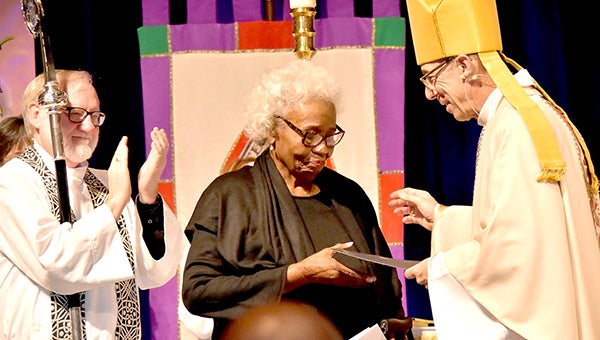George receives Episcopal Church honor
Published 6:03 pm Wednesday, April 10, 2019

- SUBMITTED • The Vicksburg Post WELL-DESERVED: Anita Parrott George, a native of Vicksburg, receives an honorary cannon from the Episcopal Diocese of Mississippi’s 192nd Annual Council earlier this year in Hattiesburg. The award was presented by Mississippi Bishop Brian Seage.
Vicksburg native Anita Parrot George was named an honorary canon to the Cathedral Church of St. Andrew in Jackson during the Episcopal Diocese of Mississippi’s 192nd Annual Council.
Presented by Mississippi Bishop Brian Seage, George was awarded the honorary cannon for a lifetime of working to improve race relations during the gathering, which was held in Hattiesburg earlier this year.
“This has been affirming in ways I cannot even describe,” George said, “And I just thank God for the strength and the family and friends of every color across this nation who have guided me and who have supported me and loved me.”
George was born on Drummond Street, she said, in apartments that had been located behind the Stained Glass Manor.
Her father, Bennie Parrott, had worked at the facility, which at the time had been an “old folks home,” she said, and at the YMCA on Clay Street.
Her mother, Rosa Parrott, had been a schoolteacher at Bowman High School.
George said the family eventually moved to Marcus Bottom when she was around nine years old.
“It had become clearer to my parents that as we (she and her siblings) started to seek playmates, that we weren’t going to have any living there, so they bought a little house in the Bottom,” she said.
With the move came a different “way of life”, George said, which led her to begin questioning the “world she had been born into.”
After graduating from Bowman High School, George furthered her education at Alcorn College, Arkansas AM&N in Pine Bluff, the University of Florida and then at Mississippi State University where she received her PH.D.
She has taught in the Vicksburg, Leflore County and Chicago public schools and has served on various levels as a teacher educator at the U of F, MSU and Grambling State University.
And through all of these experiences, she said, racial reconciliation has served as a backdrop to most of her professional work.
“I became aware of the difference when I was first going off to college with the racial opportunity differences as well as the discrimination, so it was kind of natural that when I moved back to Mississippi I picked up an interest again and that was always a part of my teaching,” she said.
When living in Vicksburg, George was a member of St. Mary’s Episcopal Church.
She now resided in Starkville, where she attends the Episcopal Church of the Resurrection.
George has served as the co-chair of the task force on Racial Reconciliation in the Diocese of Mississippi and was an advisory board vice chair for the William Winter Institute for Racial Reconciliation at the University of Mississippi.
She was elected to serve as a deputy to the General Convention seven times, and was involved in much of the church’s anti-racism work and also served two terms on the Executive Council of the Episcopal Church.
While her honorary canon requires no “formal commitment,” the Bishop, George said, told her that she still had work to do.
“When I spoke with the Bishop, he said, we want you to continue training and bringing new and younger people into the work and going to parishes or congregations as they may need you to come,” she said.
“And he expects that when I can and am able, to continue some racial reconciliation training and I have made that commitment.”
While George admits there has been progress in race relations, she said, there is still work to be done.
In a recent reflection, George wrote, “Yes, we have been busy with efforts toward racial reconciliation and eliminating racism, and much has changed, many have been transformed. Yet, glaring statistics point to alarming trends, suggestive of the resurgence of our troubled racial past. We must go beyond the very necessary outer work of training and enactment of laws and programs to the solitude of our inner work of formation, transformation, and re-formation.”






